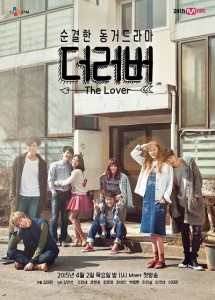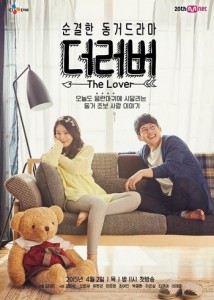 The weird part of Tumblr is a dark and mysterious place. Once you are in it, it’s difficult to get out. Even if you manage to accomplish the Herculean task of closing your tab, snippets of your unusual encounter continue to pervade your daily existence. This is exactly how I ended up watching The Lover. A GIF set floated by on my dashboard, and my subconscious itched to watch that bizarre goodness extended over 12 episodes.
The weird part of Tumblr is a dark and mysterious place. Once you are in it, it’s difficult to get out. Even if you manage to accomplish the Herculean task of closing your tab, snippets of your unusual encounter continue to pervade your daily existence. This is exactly how I ended up watching The Lover. A GIF set floated by on my dashboard, and my subconscious itched to watch that bizarre goodness extended over 12 episodes.
An Mnet innovation, The Lover is an omnibus series comprising the stories of four couples who live in a single apartment complex. The premise of the drama is simple: four couples in love and the problems which accompany their relationship as they cohabit in a single apartment. But it is exactly this simplicity that generic romantic K-drama has miserably failed to deal with. Too much investment in background music, naïve heroines, abusive heroes, first kisses, first hand-holding, first fight, first hand wrenching — you catch my drift, right? — has left K-dramas horribly predictable and painfully unrealistic.
The Lover breaks that mould with its honesty and maturity. But here’s the catch: Don’t expect a deep, emotional and philosophical experience. Instead, expect unrelenting silliness and madness; expect childish sex jokes and, well, just lots of sex jokes; and most importantly, expect tons of repulsion. Love isn’t only about a cloudburst of cherry blossom leaves. Love is disgusting: it is knowing women have body hair, including some stubborn ones which refuse to come off; it is accepting the noxious fumes of your significant other’s farts; it is snot and spit; offensive nicknames and shit; dicks as glow sticks; and it certainly can survive without the institution of marriage. Love is just bad poetry.
Room 609
 Room 609 is occupied by the couple that has been living together for the longest — two years — and is my favourite couple out of the four. Oh Do-si (Oh Jung-se) freelances as a voice actor, contributing minimal amounts to the house finances, while Ryu Doo-ri (Ryu Hyun-kyung), a blogger, provides most of the financial support. While money is not the only issue between the partners, it is often the most pertinent issue, which leads us to questions of agency and ownership. At times, the drama comments on it comically, such as when the two bicker with each other on who owns what after Do-si makes a flippant remark on the possibility of dividing property if they break up. Do-si ends up getting thrown out of the house because Doo-ri paid the greater part of the rent. The same issue crops up in darker colours in the last episode when Do-si’s parents are ill, and Doo-ri offers marriage as a way out so that she can provide him legitimate financial support without their parents raising eyebrows. Do-si refuses saying that he didn’t want to get married as a means to something. He did not want to become a burden on Doo-ri and would prefer becoming independent before jumping into something as conclusive as marriage.
Room 609 is occupied by the couple that has been living together for the longest — two years — and is my favourite couple out of the four. Oh Do-si (Oh Jung-se) freelances as a voice actor, contributing minimal amounts to the house finances, while Ryu Doo-ri (Ryu Hyun-kyung), a blogger, provides most of the financial support. While money is not the only issue between the partners, it is often the most pertinent issue, which leads us to questions of agency and ownership. At times, the drama comments on it comically, such as when the two bicker with each other on who owns what after Do-si makes a flippant remark on the possibility of dividing property if they break up. Do-si ends up getting thrown out of the house because Doo-ri paid the greater part of the rent. The same issue crops up in darker colours in the last episode when Do-si’s parents are ill, and Doo-ri offers marriage as a way out so that she can provide him legitimate financial support without their parents raising eyebrows. Do-si refuses saying that he didn’t want to get married as a means to something. He did not want to become a burden on Doo-ri and would prefer becoming independent before jumping into something as conclusive as marriage.
As is evident, the commentary stretches itself from simply relationships between two people to the powerful institution of marriage and to the ambiguous status of live-ins, wherein marriage comes with a set of rights while live-in comes with zero solidity or rights of partners. This is, of course, the legal status of marriage and live-in as conspired by the society and the government. The real power of The Lover lies in its complete disregard for the legal realities. The drama goes to comical lengths to show that this couple is no different than a married couple. In fact, they just might be better than a married couple. They have excellent communication, be it in discussing problems of life or in trying to spice up their sex lives with dirty talk and role-play. At the same time, they respect each other’s spaces and try their level best not to intrude into each other’s life.
The phrase “try their level best” is key because it reasserts the experimentative and inconclusive nature of their relationship, which the drama supports wholeheartedly. It means there are times when things work, and there are times when they don’t, and that’s okay because figuring things out is the purpose of being in a relationship. Once you know everything about a person, there is not much left to the relationship. Simultaneously, it celebrates the mundane and routine joys of life, such as recognizing certain traits of your partner that they exhibit when angry and acting according to it or getting attached to a defective car because it holds a lot of memories or performing a dance terribly. There is an immense sense of freedom, trust and respect in this couple where each is assured that they’ll never be judged by the other for their weird habits. The feeling is exactly like walking around in your house without a bra — sweet abandon.
This is skillfully contrasted against Doo-ri’s brother who is ashamed of their live-in status and believes that marriage should only be within virgins. Not so surprisingly, his would-be bride and he are an absolute mess with zero communication and understanding.
Room 610
 This room is occupied by Choi Ji-nyeo (Choi Yeo-jin) and rising superstar Jung Young-joon (Jung Joon-young). They have to be the couple with the most bizarre antics. Glow-in-the-dark condoms, obsession with breasts, mad urge to wear a bra, poop jokes during lunch, oedipal complex, wet dreams, reenacting Tae-yeon’s Oreo scandal – this couple exposes all the secrets anyone hides under the garb of a mundane life. While money and power problems persist even in this couple, the root cause is the 12 year age difference between them: Ji-nyeo is 33 years old while Young-joon is 21 years old. There are no obvious rifts right at the beginning, or, rather, they have overcome the basic rifts that come with a huge age gap. Young-joon is financially dependent on her, and while Ji-nyeo does feel pissed by the giant baby, it’s only mild irritation. But what binds them together — the child in Young-joon and the protective figure in Ji-nyeo — is also what causes all the problems.
This room is occupied by Choi Ji-nyeo (Choi Yeo-jin) and rising superstar Jung Young-joon (Jung Joon-young). They have to be the couple with the most bizarre antics. Glow-in-the-dark condoms, obsession with breasts, mad urge to wear a bra, poop jokes during lunch, oedipal complex, wet dreams, reenacting Tae-yeon’s Oreo scandal – this couple exposes all the secrets anyone hides under the garb of a mundane life. While money and power problems persist even in this couple, the root cause is the 12 year age difference between them: Ji-nyeo is 33 years old while Young-joon is 21 years old. There are no obvious rifts right at the beginning, or, rather, they have overcome the basic rifts that come with a huge age gap. Young-joon is financially dependent on her, and while Ji-nyeo does feel pissed by the giant baby, it’s only mild irritation. But what binds them together — the child in Young-joon and the protective figure in Ji-nyeo — is also what causes all the problems.
Ji-nyeo feels tired of the fact that Young-joon refuses to take responsibility because he is young, wild and free. This attitude reminds her of the temporary nature of their relationship. Marriage cannot be the end to the relationship if he continues to be irresponsible. She is immensely conscious of her age and the ‘cougar’ label that comes attached with dating a younger man and, consequently, constantly seeks validation from Young-joon. Young-joon, on the other hand, is equally conscious of his childish nature and the fact that he is not ‘much of a man.’ When a wealthy chef friend of Ji-nyeo comes over, Young-joon’s trembling and unsure masculinity is amplified in terms of his ‘poor’ physicality but more so in terms of his (lack of) wealth, stability and power.
The last episode, which is the only episode where a real crisis occurs in all couples, shows Young-joon developing a backbone after having achieved some stability due to his sudden popularity as a singer. This couple comes off as immature but delivers some of the most critical insights into the troubles that come with such kind of relationships. Quite surprisingly, this is the only couple that gets married and has a baby at the end.
(Just a warning though: Sometimes the faces Young-joon makes can really throw you off track.)
Room 510
 A cold shudder runs through my spine whenever I think of this couple, but they are crucial to the narrative of the drama and the topic of live-ins. Park Hwan-jong (Park Jong-hwan) and Ha Seol-eun (Ha Eun-seol) are engaged to be married the same year they start cohabiting, with the intention of knowing each other more intimately. This couple exemplifies why live-ins can’t be treated only as a temporary thing you do before marriage or a precursor to marriage. Live-ins are essentially continuations, not beginnings. You live with a person because you have developed a certain degree of attachment with and trust in the person to be sharing the same air as them 24/7. You do not do so when you are barely familiar with the habits of your significant other or when your sole purpose is marriage.
A cold shudder runs through my spine whenever I think of this couple, but they are crucial to the narrative of the drama and the topic of live-ins. Park Hwan-jong (Park Jong-hwan) and Ha Seol-eun (Ha Eun-seol) are engaged to be married the same year they start cohabiting, with the intention of knowing each other more intimately. This couple exemplifies why live-ins can’t be treated only as a temporary thing you do before marriage or a precursor to marriage. Live-ins are essentially continuations, not beginnings. You live with a person because you have developed a certain degree of attachment with and trust in the person to be sharing the same air as them 24/7. You do not do so when you are barely familiar with the habits of your significant other or when your sole purpose is marriage.
This couple is awkward as hell. Hwan-jong can’t communicate his sexual desires with Seol-eun who, in fact, looks often uninterested in having sex with him while Seol-eun is too self-conscious to reveal her weaknesses. It’s just not Seol-eun being insecure; it is also Hwan-jong being a participant in entrenching those insecurities, which is best captured in Seol-eun gluttonous nature. She loves to eat, but she does not feel comfortable revealing it to Hwan-jong, and Hwan-jong actually feels irritated by the amount she consumes. Hwan-jong is extremely indecisive so while he urges her to let go of her obsession with perfection, he is also unable to accept her flaws. Their relationship is so green that she finds it difficult to inform him that she is pooping in the loo and does not wish to have sex with him. They are that awkward.
A direct contrast can be drawn with the couples in Room 609, who live together because they love each other and enjoy each other’s company, and Room 510, who live with each other because it is a rehearsal for marriage. But the drama instead eggs you to draw comparisons between Room 610 and Room 510, which makes sense because Room 609, even in its flawed ways, is the ideal relationship — flawed perfection and all that jazz — but 610 and 510 are at different levels in the race to that perfection. Therefore, you have Ji-nyeo and Seol-eun constantly competing with each other, trying to figure out who has the better body, who has landed the better boyfriend, but the greenness of Seol-eun’s and Hwan-jong’s relationship is maintained by Hwan-jong’s unassertive and confused attitude. He fails to take a stand for his partner while childish Young-joon proves to be a more stable support system for Ji-nyeo. I would have been sorely disappointed had the drama posited this couple as a ‘normal’ couple, but thankfully the drama takes note of the dysfunctional and toxic nature of this couple and ends with Ji-nyeo getting into a relationship with a white foreigner and Hwan-jong reverting to a single but more fulfilling life.
Room 709
 The last couple is not exactly a couple, for they do not realize their feelings for each other until the last episode but are instead two male roommates who fall for each other. Introverted Lee Joon-jae (Lee Jae-joon) meets Japanese roommate and traveller Takuya (Takuya Terada (Cross Gene)) and gradually gets enchanted by him. I was worried that they would be reduced to being the funny gay couple, but, much to my delight, their relationship is underlined with both humour and complexities. The relationship looks mostly one-sided since Joon-jae dominates the narratorial voice, and we barely get to know Takuya’s thoughts.
The last couple is not exactly a couple, for they do not realize their feelings for each other until the last episode but are instead two male roommates who fall for each other. Introverted Lee Joon-jae (Lee Jae-joon) meets Japanese roommate and traveller Takuya (Takuya Terada (Cross Gene)) and gradually gets enchanted by him. I was worried that they would be reduced to being the funny gay couple, but, much to my delight, their relationship is underlined with both humour and complexities. The relationship looks mostly one-sided since Joon-jae dominates the narratorial voice, and we barely get to know Takuya’s thoughts.
Joon-jae battles both with his burgeoning feelings themselves and his burgeoning feelings for a man, and while it doesn’t take him much to realize he is in love, he does get paranoid about not revealing it to Takuya. Cue the standard push-and-pull where Joon-jae is afraid of coming out to Takuya as well as scared and angry that Takuya just might get into a heterosexual relationship. The temporariness of their relationship is amplified because of Joon-jae’s inner battles, the impossibility of an open homosexual relationship, the silence from Takuya and the fact that Takuya is going to leave in three months. The drama manages a fine line between the angst this couple deserves and the comedy the drama in general stands for. From phallic imagery and Takuya teaching Joon-jae how to moan like Japanese pornographers to Joon-jae’s vulnerability when he finally confesses his love and Joon-jae taking a firm stand in their relationship in the last episode, this couple is a roller coaster ride of emotions.
However, this couple failed to make an impact on me. I expected too much out of them and was left with meagre returns. Part of the problem is, of course, that their story actually begins from the last episode and part of the problem is Takuya’s silence. He almost starts resembling the naïve but pure K-drama heroines that are not given a voice while the male actor broods and broods and makes all the decisions.
 Kim Min-seok has created a wonderful, mature and insightful K-drama on live-in relationships with a directness unseen in generic K-drama. It is gross and disgusting, and that is its charm. The drama uses the lovely analogy of islands to explain live-ins, and it is lovely because while there is this feeling of being stranded, it is also a whole place in itself. It is not a bridge or a pathway to something bigger or better. Finally, the drama is a wonderful commentary on what Virgina Woolf said ages ago and which is also applicable for live-ins: “For in marriage a little license, a little independence there must be between people living together day in and day out in the same house…”
Kim Min-seok has created a wonderful, mature and insightful K-drama on live-in relationships with a directness unseen in generic K-drama. It is gross and disgusting, and that is its charm. The drama uses the lovely analogy of islands to explain live-ins, and it is lovely because while there is this feeling of being stranded, it is also a whole place in itself. It is not a bridge or a pathway to something bigger or better. Finally, the drama is a wonderful commentary on what Virgina Woolf said ages ago and which is also applicable for live-ins: “For in marriage a little license, a little independence there must be between people living together day in and day out in the same house…”
While watching the drama, I was reminded of a particular episode of Hello Counselor featuring Kai and Lay from Exo, where a man’s complaint was that his girlfriend felt comfortable enough to fart around him, and he disliked that. Surprisingly, Kai mentioned that he felt jealous of such relationships because of the level of comfort shared between partners, and that, dear friends, is The Lover in a microcosm: it’ll make you jealous of couples who aren’t ashamed of how the human body and the human heart function.
P.S.: Play close attention to the song playlist in each episode!
(Mnet)


